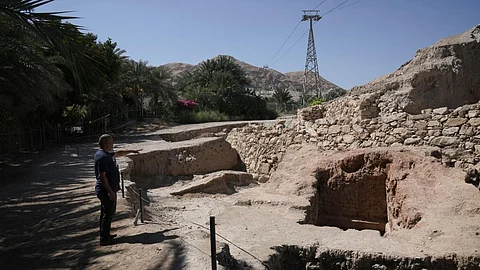
- NEWS
- the EDIT
- COMMENTARY
- BUSINESS
- LIFE
- SHOW
- ACTION
- GLOBAL GOALS
- SNAPS
- DYARYO TIRADA
- MORE

The United Nations' cultural organization inscribed the pre-historic site of Tell al-Sultan, near the Palestinian city of Jericho in the occupied West Bank, on its World Heritage List Sunday.
Tell al-Sultan, which predates Egypt's pyramids, is an oval-shaped tell, or mound, located in the Jordan Valley that contains the prehistoric deposits of human activity.
The UNESCO decision, which was posted by the organization on X, formerly Twitter, was taken at its 45th World Heritage Committee meeting held in Riyadh.
"The property proposed for nomination is the prehistoric archaeological site of Tell al-Sultan, located outside the antique site of Jericho," UNESCO's assistant director general, Ernesto Ottone, said at the session.
The site was inscribed following a three-year candidacy "during which no state party raised any objections", said a diplomat, speaking on condition of anonymity as he was not authorized to speak to the media.
"There are no Jewish or Christian remains found at the (Tell al-Sultan) site. It's a place of pre-historic remains," the diplomat told AFP.
Israel quit the UN organization in 2019 over accusations it fosters an anti-Israel bias but sent a delegation to this year's meeting in Saudi Arabia.
The Palestinian Authority, acknowledged by the United Nations as a non-member observer state, welcomed the listing of the Tell al-Sultan site.
Palestinian President Mahmud Abbas said he considered the decision to inscribe Tell al-Sultan "a matter of great importance and evidence of the authenticity and history of the Palestinian people".
He vowed that the Palestinian authorities would "continue to preserve this unique site for all humanity", according to a statement from his office.
Diverse Palestinian heritage
UNESCO's listing shows that the Tell al-Sultan site is "an integral part of the diverse Palestinian heritage of exceptional human value", Palestinian tourism minister Rula Maayah, who was attending the meeting in Riyadh, said in a statement.
Given Tell al-Sultan's "importance as the oldest fortified city in the world… it deserves to be a World Heritage Site," she said.
"A permanent settlement had emerged here by the 9th to 8th millennium BC due to the fertile soil of the oasis and easy access to water," UNESCO said on its website.
UNESCO said the "skulls and statues found on the site" testify to cultic practices among the neolithic population there, while the early bronze age archaeological material shows signs of urban planning.
"Vestiges from the middle bronze age reveal the presence of a large Canaanite city-state occupied by a socially complex population," UNESCO added.
The Tell al-Sultan site has been under excavation for over a century and is billed as the oldest continuously inhabited settlement on the planet, Palestinian official Wafa news agency reported.
It is the fourth Palestinian site to be listed on UNESCO's World Heritage list, alongside the Church of the Nativity and the Old City of Hebron.
Israel has occupied the West Bank — now home to some three million Palestinians — since the 1967 Six-Day War, when it also seized the Gaza Strip, the densely populated coastal enclave it has since withdrawn from.
The Palestinians want these territories for their future state, along with annexed east Jerusalem as its capital.
Jericho is one of the oldest inhabited cities on the planet and is a major tourist destination in the Palestinian territories.
UNESCO urged for the protection of other archaeological sites in Jericho.
"The other archaeological sites located in Jericho, covering among other Jewish and Christian heritage, also have important historical interest and deserve to be preserved as well," said Ottone.
Archaeology is a highly political subject in Israel and the Palestinian territories, and some discoveries have been used to justify the territorial claims of each people.
